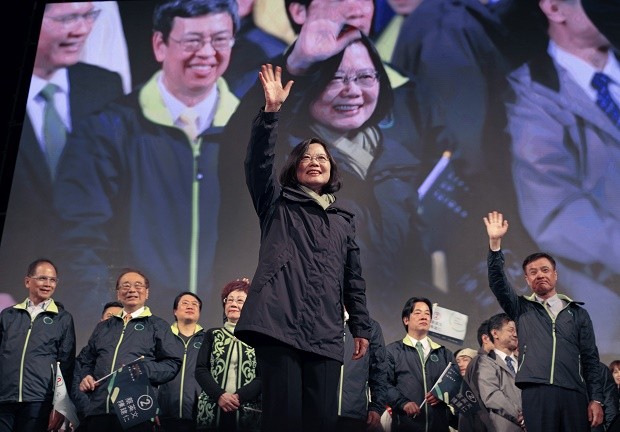Beijing warns Taiwan as woman opposition leader wins presidency

Taiwan’s Democratic Progressive Party, DPP, presidential candidate, Tsai Ing-wen, raises her hands as she declares victory in the presidential election Saturday, Jan. 16, 2016, in Taipei, Taiwan. AP
TAIPEI, Taiwan — Taiwan’s China-sceptic main opposition leader Tsai Ing-wen won a landslide victory to become the island’s first female president Saturday, eliciting a warning from Beijing against any move towards independence.
Fireworks lit up the sky at the headquarters of Tsai’s Democratic Progressive Party (DPP) as thousands gathered to celebrate the historic win over the ruling China-friendly Kuomintang (KMT).
In her first comments to media, Tsai warned that Chinese “suppression” would damage ties with the mainland.
“Our democratic system, national identity and international space must be respected. Any forms of suppression will harm the stability of cross-strait relations,” she said.
Although Taiwan is self-ruling after it split with China following a civil war in 1949, it has never declared independence and Beijing still sees it as part of its territory awaiting reunification.
READ: US $1.83 billion arms sales for Taiwan draws China’s ire
Support for Tsai has surged as voters have become increasingly uneasy about a recent rapprochement with China under outgoing KMT president Ma Ying-jeou.
Beijing responded sternly to Tsai’s election, with China’s Taiwan Affairs Office warning that the Chinese government would “resolutely oppose any form of secessionist activities seeking ‘Taiwan independence'”.
In a strongly-worded editorial, Chinese state news agency Xinhua said the DPP’s return to power “poses grave challenges to cross-Strait relations” and had “aroused concerns” about Taipei’s relationship with Beijing.
Tsai’s victory came on the same day that outrage erupted over the treatment of 16-year-old Taiwanese K-pop star Chou Tzu-yu, who was forced to record a video apology after angering Chinese netizens by flying a Taiwanese flag in a recent online broadcast.
Tsai specifically referred to Chou in her address, saying her case had “shaken Taiwanese society”.
READ: PH, Taiwan sign pact to resolve disputes in overlapping sea territories
“This particular incident will serve as a constant reminder to me about the importance of our country’s strength and unity to those outside our borders,” she said.
Tsai has toned down the DPP’s traditionally pro-independence message to assuage Beijing and calm nerves in the United States — Taiwan’s major ally — which does not want to see tensions flare.
In her address to media she pledged to “work towards maintaining peace and stability” in relations with China, but emphasized it must reflect public will.
Jubilant supporters expressed their faith in Tsai as she later addressed the crowds, promising to be a strong leader.
“I’m very confident — we were cheated by Ma’s government for so long,” said Jimmy Lai, 45.
Washington congratulated Tsai on the victory.
“We share with the Taiwan people a profound interest in the continuation of cross-Strait peace and stability,” State Department spokesman John Kirby added.
British Foreign Secretary Philip Hammond also congratulated Tsai, saying he hoped Taiwan and China would “continue their dialogue to resolve differences and maintain the recent trend of constructive relations”.
Tsai remains president-elect until she takes office on May 20.
KMT disaster
Tsai secured 56.12 percent of the vote, according to the Central Election Commission, with the KMT’s Eric Chu on 31.04 percent.
It was by far the biggest mandate ever won by a DPP president.
Chu called the defeat “an unprecedented drastic change for the KMT” as the party also lost control of the legislature for the first time.
“This is a stunning result that completely overturns the history of Taiwanese elections. Never before has the DPP got anywhere near such a level in national elections,” said Jonathan Sullivan, professor of Contemporary Chinese Studies at the University of Nottingham.
Analysts said ties with Beijing would inevitably cool as China watches Tsai closely.
“Cross-strait ties will be slowing in the near term as Beijing considers her to be independence-leaning. Future developments will depend on her actions,” said Li Fei of the Taiwan Research Institute of China’s Xiamen University.
Tsai disappeared from China’s most popular social network following her victory, with censors working swiftly to block searches for “Tsai Ing-wen” and “Taiwan elections” on the Twitter-like Weibo network.
Ma had overseen a dramatic rapprochement with China since coming to power in 2008, culminating in a summit with Chinese President Xi Jinping in November.
Yet despite more than 20 deals and a tourist boom, closer ties have exacerbated fears that China is eroding Taiwan’s sovereignty by making it economically dependent.
Low salaries and high housing prices are also riling voters who feel they have not benefited from the warming relations.
Beijing has warned it will not deal with any leader who does not recognize the “one China” principle, part of a tacit agreement between Beijing and the KMT known as the “1992 consensus” which is the bedrock of the rapprochement.
The DPP has never recognized the consensus.














